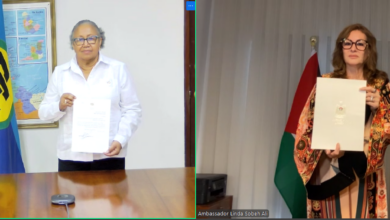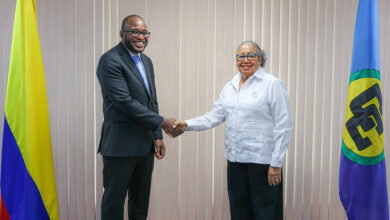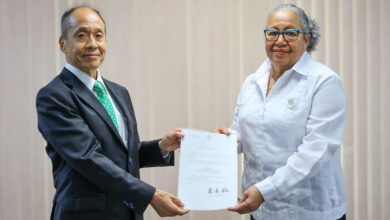It is a special pleasure for me, as Secretary-General of the Caribbean Community, to welcome you to the Fifth Meeting of the Council for Human and Social Development (COHSOD). This Council is one of the critical organs of the Community. In focusing as it does on vital areas such as education, health, youth, sport, gender and culture, it is concerned with the issues that directly affect the quality of life of the people of this Region. Indeed, the Community recognises that the implementation of the Caribbean Single Market and Economy – the current flagship activity of the Community – is in the end really only a mechanism for achieving the ultimate goal of the Community and that is, an enhanced quality of life for our citizens. Evidently, COHSOD more than any other CARICOM Body makes that statement.
Striving for coordinated strategies
The Secretariat and indeed the other organs of the Community, are therefore pleased that COHSOD has adopted as the theme of this Meeting: Investing In Human Resources With Equity. It will certainly bring about greater cohesion to its work. Also, in this context, we highlight the efforts being made to institutionalize relations with other partners and to create viable networks in the execution of its various programmes.
This networking and collaborative approach is aptly illustrated in the recently established initiative of the Pan Caribbean Partnership for HIV/AIDS. This partnership which is coordinated by the CARICOM Secretariat comprises the following core agencies: the Caribbean Epidemiological Centre (CAREC), Caribbean Co-operation in Health, the Caribbean Health Research Council, (CHRC), the Caribbean Regional Network for People Living with AIDS, (CRN+), UNAIDS and the University of the West Indies (UWI). It is supported by several donor agencies including the Canadian International Agency (CIDA), the Department for International Development (DFID), The European Commission and the World Bank.
The Partnership has already attracted a series of pledges to support clusters of activities that revolve around advocacy, prevention and care including joint accessing and negotiating with pharmaceutical companies for better prices for anti retroviral drugs, joint research and resource mobilization. It provides a model for articulating the regional action plan and an example for the respective national HIV/AIDS programmes.
Also the Partnership has established a Programme Implementation Unit (PIU) within the Secretariat. This was made possible with funding from the European Commission. A Programme Manager for the PIU has just been appointed, one Mr. Carl Brown, a native of St. Vincent and the Grenadines. Finally also attached to the Unit are an Advisor on secondment from UNAIDS and two consultants supported by CIDA. The Partnership is now ready to roll, to save lives and to foster our health development, sensitive to the theme – The Health of the Region is the Wealth of the Region – indeed.
This meeting of COHSOD will also benefit from the deliberations and recommendations of the recently concluded Regional Task Force(s) and Policy Round Tables on Gender and Development and on the Demand Reduction for Drugs respectively. This emerging mechanism for programme delivery is yet another indication of the networking and collaborative approach to which we are committed.
HRD strategy critical to CSME
As the Region focuses on the many activities necessary to effect the CSME, the work of this Council in streamlining arrangements for the free movement of services and people assumes great significance and may I add, greater urgency. Not surprisingly, there is ongoing debate throughout the Region, not so much about the principle of economic integration, but about the actual strategies for achieving a viable regional system which would ensure that the expectations of specific countries, communities and various groups, including youth and women, would materialise within a realistic time frame and that requisite benefits would accrue to them.
Thus, when our Heads of Government met in Montego Bay in 1997 and outlined a HRD Strategy for the Region, it was in full recognition of the fact that in order for the countries of the Caribbean to achieve the necessary competitive advantage, a new approach had to be developed. At that time, they were particularly concerned that tertiary level enrolment at under 6 percent of the adult population in the Caribbean was too low to sustain our development objective. Our 6 per cent level paled in comparison with the over 12 percent in Latin America, 15 percent in South East Asia and over 20 percent in Europe and North America. A target of 15 per cent by year 2005 was agreed on to be set for the Region, and at least one country set a national target of 20 per cent by that date.
Heads of Government were also concerned with improving approaches to science and technology teaching and learning and with equipping citizens to communicate in foreign languages.
These elements of the HRD strategy adopted the, remain pertinent today. I am glad to note from the Working Document for this meeting that much progress has been made in accomplishing the targets set. For example, enrolment in the tertiary sector has increased significantly over the past five years. This has resulted in part from efforts at both national and regional levels to rationalise programmes and to ensure articulation between programmes at Universities and other tertiary level institutions. The creation of new institutions has also further contributed to this process. We must press on especially given the significant human resource leakages to which the Region is subjected.
Influences of globalization
Indeed, the drastic changes in the world since that Heads of Government Meeting in 1997, the accelerating pace of liberalization and globalization and now the grim spectre of terrorism, have together imposed a greater urgency for the Region to regroup, reassess its strategies, make the necessary changes and press on. For no economic policy however theoretically sound, no environmental impact assessment, no negotiating machinery for the regions performance within the FTAA and the WTO or UN systems, no action plan for reducing poverty or the spread of HIV/AIDS can be developed much less satisfactorily implemented without appropriate skills and without the necessary provision for the development of such skills.
COHSOD has a responsibility to help us think through what and how to make these changes. Thus the other focus in this meeting, that is on a revitalised HRD Strategy, is most appropriate. In your deliberations, it is important to encompass not only the core elements of the human resource development: education, health and labour, but it is also necessary, indeed vital, to consider mechanisms for addressing the special case of youth and for incorporating priority policies to handle specific issues that could seriously affect these resources, like the illicit drugs and crime and the scourge of HIV/AIDS. HIV/AIDS is viciously decimating our work force, and particularly our younger men and women between 19-44 years. The abuse of and trafficking in illegal drugs and associated crime, are creating a group of young men and women committed to an erosive sub-culture. Any revision of our HRD strategy must therefore confront this phenomenon among others by coming up with implementable policy options on what is required to develop creative and productive citizens, for this new century, indeed certainly for this post-September 11, 2001 world.
Statistics and information
A precondition of any such strategy is “the evidence”. On what basis do we plan with any certainty to develop these creative and productive citizens? I note with interest that one of your sessions is devoted to the mechanics of social statistics. Unless this region pays greater attention to strengthening its statistical and information data bases, our policies and strategies will remain a patchwork of “guestimates” subject to the quirks and idiosyncrasies of policy makers. This is so in human resources development as it is in services, for example. The Secretariat is making every effort to facilitate the strengthening of regional and national capabilities to produce evidenced-based information. The current programme of work with the United Nations Statistical Agency and our collaboration with UNECLAC for improving social statistics are important beginnings. They must be sustained if HRD planning is to be effective.
The Community therefore looks to COHSOD’s leadership in the planning and successful implementation of our HRD strategy.
Strengthening the COHSOD system
These many critical responsibilities of COHSOD require Ministers to pay some attention to the effective functioning of COHSOD itself. The new arrangements for the Community effected in the Revised Treaty of Chaguaramus were intended among others, to make the social sector of the Community more viable. Last year when the COHSOD IV agreed to an integrated/inter-sectoral theme and the attendant integrated planning of activities, it was a commitment to the creation of a regional social sector development mechanism geared to better addressing the multi-faceted challenges that we face. This year the emphasis on refining and further development of an integrated HRD Strategy for the Region is a concretisation of the process.
In this context, I am firmly of the view that if the COHSOD system is to function effectively there is need also for the establishment and efficient operationalization of national COHSODs. I note that some countries have actually held their national COHSODs. They are to be complimented. I wish to encourage those that have not yet done so to follow this example. All the evidence points in the direction of the desirability of inter-sectoral programming and planning. Your own multi-sectoral portfolios, are indicative of this trend. This inter-sectoral Council is an integral part of the new structure designed to move the Community away from business as usual, to reduce duplication of effort and effect rationalization of human and financial resources and to focus on the ultimate objective of enhancing the quality of life of the people of the Community.
Facing uncertainty with a positive plan of action
Finally, Hon. Ministers, Ladies and Gentlemen, COHSOD V is taking place at a time when there is understandably a widespread feeling of insecurity about the future of the region in a rapidly changing global scenario. The September 11 terrorist attack in the USA, which took over 6,000 lives, a significant number of them being Caribbean nationals, is the most chilling reminder that devastation in one part of the globe can plunge the entire global system into economic, political and social disarray. The resulting loss and uncertainty in the Caribbean is bound to intensify in the immediate period as the repercussions of this attack, tangibly affect our already fragile vulnerable economies and create new and unexpected instabilities. The Caribbean tourism industry which is so highly dependent on the USA market, generates some US$2B per annum and employs approximately 25 percent of the workforce, will suffer the greatest fallout. But other activities some dependent on it, such as the Aviation industry, as well as others including many small businesses, will suffer as well. Even remittances to the Caribbean region estimated in the last CARICOM Report (2000) to be in the vicinity of US$3billion per annum are expected to decrease substantially.
But most devastating of all is the personal loss which many families worldwide will suffer never seeing their loved ones again!
Caribbean Heads of Government will meet next week to discuss strategies to be adopted by the Region in the wake of this September 11 havoc wreaked on humanity. Your deliberations with their emphases on investing in human resources with equity is clearly most relevant and timely. Indeed, in consonance with this, I invite you at this moment as the First Meeting of an organ of the Community since the September 11 catastrophe, to stand and join me in bowing our heads for one minute in memory of those so cruelly and suddenly taken from us.
We look forward to the Report of this meeting. The Agenda and the organization of the activities for this COHSOD are fundamental to our future. I wish to thank all of you for your participation in this opening session and in particular the Hon. Ministers of Government and delegates from overseas who, despite the widespread reservation regarding flying at this time, have nevertheless persevered to be here to assist the Community in charting the way forward. We thank the other regional and international agencies that collaborate in our programmes and the social partners in the labour movement, private sector and NGO community. Ours is a major challenge but I have no doubt that we will eventually be successful.
I thank you.





